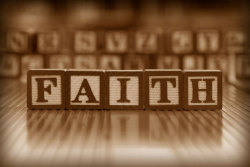To reason is to integrate perceptual evidence into concepts, propositions, and theories.
By contrast, what is faith? Below are seven definitions of faith. The definitions are in my words, but they are taken from my readings of seven philosophers of religion: William James, Søren Kierkegaard, C. S. Lewis, George H. Smith, Basil Mitchell, R. M. Hare, and Antony Flew.
If you’d like, match the above names to the numbered definitions below. The answers and sources follow.
Faith is:
1. A subjective commitment to that which one wants to be true.
2. A subjective commitment to a live option when the evidence for or against is not conclusive.
3. A turning to a hoped-for higher power upon one’s realization of one’s utter sinfulness and weakness.
4. A subjective commitment to a belief that conflicts with the evidence.
5. A belief that is modified indefinitely to avoid conflicting evidence.
6. A subjective belief that one is willing to maintain by reinterpreting conflicting evidence.
7. A feeling-based certainty based upon a direct experience of the object of one’s belief.

Quotation with names and sources:
1. A subjective commitment to that which one wants to be true. (George H. Smith, Atheism: The Case Against God (1979), Part 2.
2. A subjective commitment to a live option when the evidence for or against is not conclusive. (William James, “The Will to Believe”, 1896.)
3. A turning to a hoped-for higher power upon one’s realization of one’s utter sinfulness and weakness. (C. S. Lewis, Mere Christianity, 1943, Book 3, Chapters 11 and 12.)
4. A subjective commitment to a belief that conflicts with the evidence. (Søren Kierkegaard, “A Panegyric Upon Abraham”, from Fear and Trembling, 1843.)
5. A belief modified indefinitely to avoid conflicting evidence. (Antony Flew, “Theology & Falsification: A Symposium”, 1971.)
6. A subjective belief that one is willing to maintain by reinterpreting conflicting evidence. (R. M. Hare, “Theology & Falsification: A Symposium”, 1971.)
7. A feeling-based certainty based upon a direct experience of the object of one’s belief. (Basil Mitchell, “Theology & Falsification: A Symposium”, 1971.)
***
The above exercise is for my course in Philosophy of Religion. More readings in philosophy at my Texts in Philosophy page.
I think #4 could’ve been worded more clearly. The definition of “conflicts with the evidence” varies too widely. For example, not rejecting the null hypothesis when there’s less than 95% confidence (statistically speaking) would fit that definition. Yet the chasm between 95% confidence and the conflict of evidence with Abraham’s faith as described in [Kierkegaard] is huge, to the point of making “conflicts with the evidence” nearly meaningless. In other words, almost any thought and/or action of any complexity conflicts with some evidence somewhere.
This from a leading Bible website:
“Faith is the assured expectation of things hoped for, the evident demonstration of realities though not beheld.” (Heb 11:1) “Assured expectation” translates the Greek word hy·poʹsta·sis. This term is common in ancient papyrus business documents. It conveys the idea of something that underlies visible conditions and guarantees a future possession. In view of this, Moulton and Milligan suggest the rendering: “Faith is the title deed of things hoped for.” (Vocabulary of the Greek Testament, 1963, p. 660) The Greek word eʹleg·khos, rendered “evident demonstration,” conveys the idea of bringing forth evidence that demonstrates something, particularly something contrary to what appears to be the case. Thereby this evidence makes clear what has not been discerned before and so refutes what has only appeared to be the case. “The evident demonstration,” or evidence for conviction, is so positive or powerful that faith is said to be it.
No one gets this right off the bat — faith must be exercised, it is NOT simple acceptance, and it is most certainly not blind. Blind faith is virtual gullibility, somewhat “charming” in its naivety (Blessed are those who believe without seeing — addressed to doubting Thomas). Those who rebuke “faith” often mistake it for simple minded acceptance but “Faith” is a driving force, it substantiates itself like the life-force or the impetus of mass in motion. If one studies the above Scriptural definition of faith one will find, I believe, it encompasses the numerical list given above.
Not a single philosopher from the whole Catholic, or Scholastic, or Thomistic-Aristotelian tradition, so far as I can see. What, on these definitions, would be the propositions that constitute the so-called “preambles of faith” and why would they be (as Catholics insist) absolutely indispensable–epistemologically–to any act of faith?
I’m open to suggestion, Roger, of a good Thomist/Scholastic definition. None that I’ve come across strike me as distinctive. Maybe something from John Paul II’s “Fides et Ratio”?